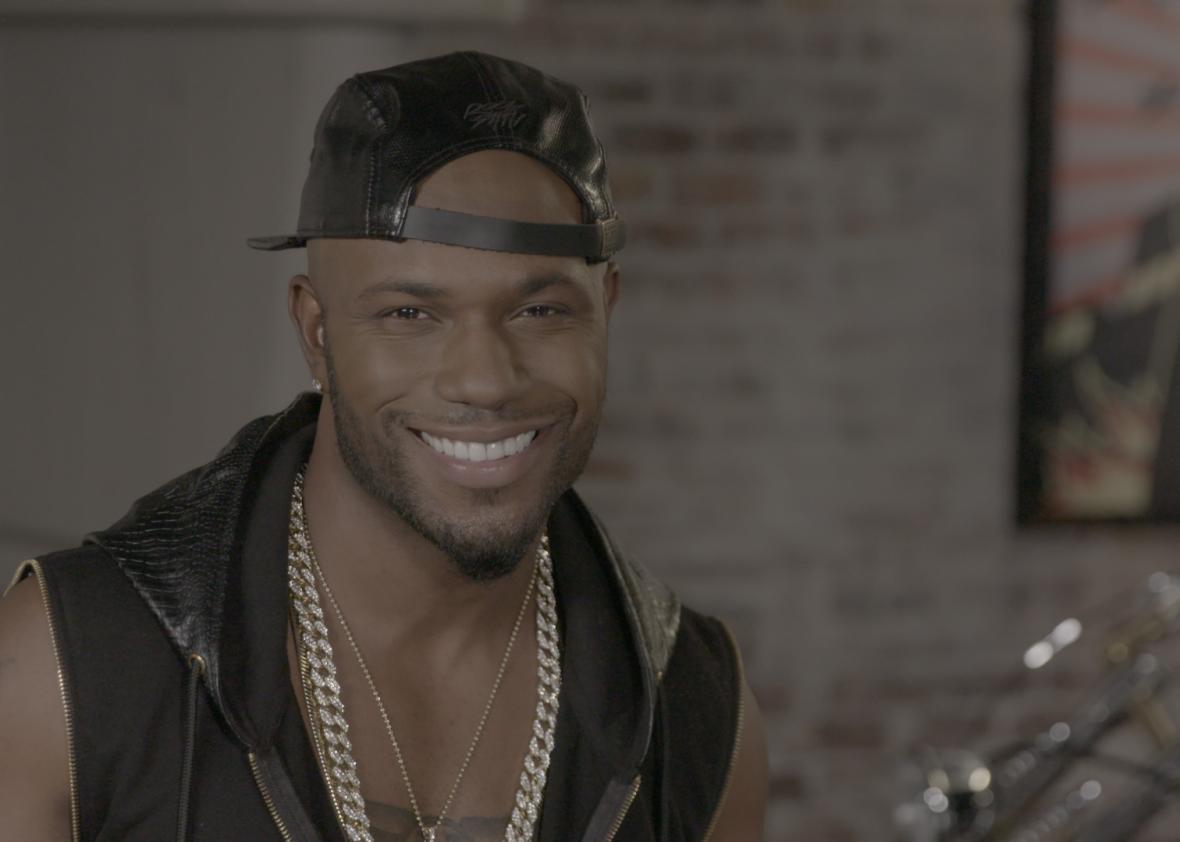More than 3.6 million viewers tuned in to VH1’s season two premiere of Love & Hip Hop: Hollywood earlier this month. A reality show focused on the Hollywood hip-hop music scene, the series has in the past followed former successful R&B artists, video vixens, actors, and girlfriends of dwindling rappers through the glitz, glamour, and delusion of their wild world. This new season of Love and Hip Hop delivers more of the same, featuring returning stars like R&B songstress Teairra Mari, rapper Soulja Boy, former B2K heartthrobs Fizz and Omarion, and fan favorites Moniece and Hazel-E. But like any ensemble reality show, Love & Hip Hop has its fair share of several newbies vying for a spot in the opening credits each season, including, this time, rapper Miles (Siir Brock) and producer Milan—two folks who happen to be in a relationship and also happen to be men.
This is no small thing for the largely straight show. Before Miles and Milan, the New York version of the franchise featured a lesbian couple, Erica Mena and her then-girlfriend Cyn Santana, but this is the first time a gay male couple has been featured. From this, it was clear that Love & Hip Hop: Hollywood is not just out to entertain its viewers this season—it is here to challenge them as well.
Before the season kicked off, a super trailer was released teasing the introduction of Miles and Milan. Fans of Love & Hip Hop have come to expect a lot from executive producer Mona Scott-Young, who excels at melodramatic breakups, uncomfortable family drama, plot twists, or all of the above moistened with a little drink-throwing. But nobody saw Miles and Milan coming, not even regular cast members. Rumors circulated online that the straight male members of the cast did not want to film with the couple. (Though, in a move that had the feel of PR strategy, Milan dismissed these rumors as false, claiming he did not experience any problems from his cast members.) In any case, viewers were primed for a gay shakeup when the new season began.
From the first episode, fans had the opportunity to see Miles and Milan share a kiss and morning bed talk. This was thrilling. A kiss might sound like a small thing, but you have to remember that moments depicting intimacy between two black men just do not happen often on screen. The show’s refusal to treat Miles and Milan as gay sidekicks who keep their best girlfriends laced in the latest fashion trends and who spout gay lingo, but rather as whole human beings who experience love, is commendable. Because gay men are capable of giving and receiving love just like straight folks, right? Of course we are.
For their part, both Miles and Milan are committed to pursuing their dreams and actively working on their romantic relationship. Milan is clearly invested in maintaining his identity, both in his relationship and in an industry that exudes homophobia. He stands firm in saying he is a black, gay male who’s equally talented and deserves love like everyone else. Over the past few episodes, we see Miles struggling to walk in his own truth. Although he’s able to admit his love for Milan in private, he battles with being open about his relationship due to his being a rapper. Usually, when people think about the resiliency of same-sex love, they are referring to the struggle it takes to thrive through multiple identities. As a gay man of color, Milan refuses to give up on any aspect of that struggle. The couple’s plot embodies that the way race and gender and sexuality intersect and complicate one another, and, most important, it does not tiptoe around the how this can wear on a couple in the middle of it all.
This honest act of representation is a big deal. Love & Hip Hop draws millions of people to their televisions and Twitter accounts to live-tweet on Monday nights, the bulk of whom are black. Seeing the couple on television will drive an important conversation about same-sex relationships and race. It will also puncture the popular—and incorrect—perception that black gays and lesbians experience homophobia more than any other community. Reality shows featuring gays and lesbians have rarely captured the authenticity of same-sex love. It’s hard enough to get a nuanced storylines around race, let alone a decent story about two black men loving each other. In offering this captivating and fresh storyline, Love & Hip Hop is doing important work.
When it comes to encouraging paradigm shifts, exposure is crucial. It has been proven time and again that people grow in their understanding and acceptance of LGBTQ people after personally knowing some or seeing quality representations of them onscreen. The same-sex marriage victory is clear evidence of this. Of course, no single depiction is perfect; but luckily, we don’t have to settle for one. Love & Hip Hop has started a much-needed dialogue. I am hopeful that Miles and Milan’s story will continue to flourish and be a catalyst for more characters to come.
